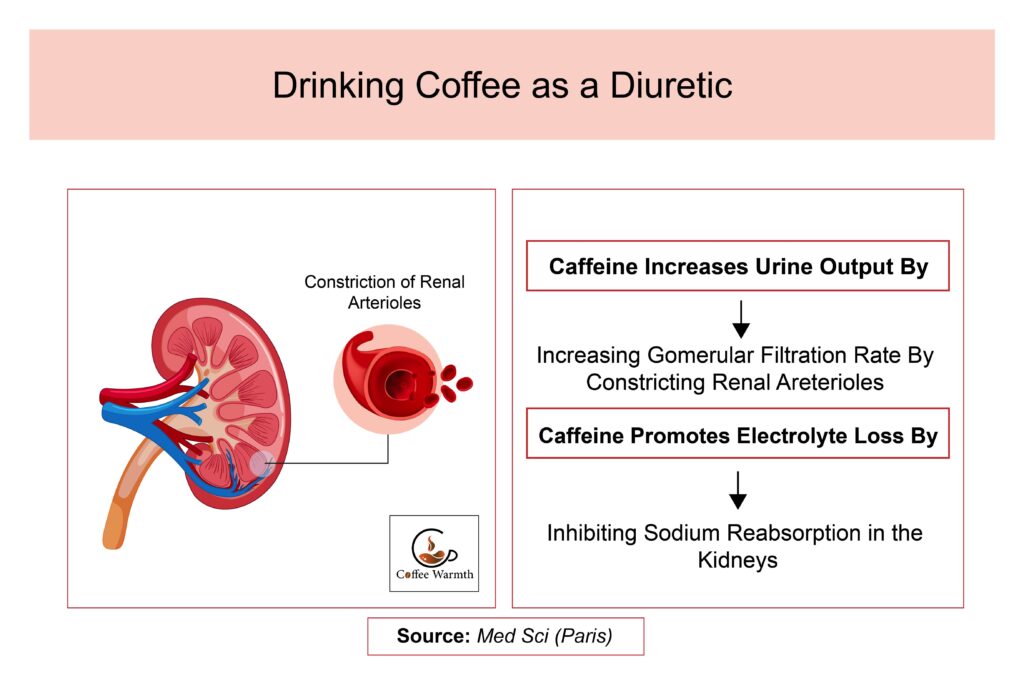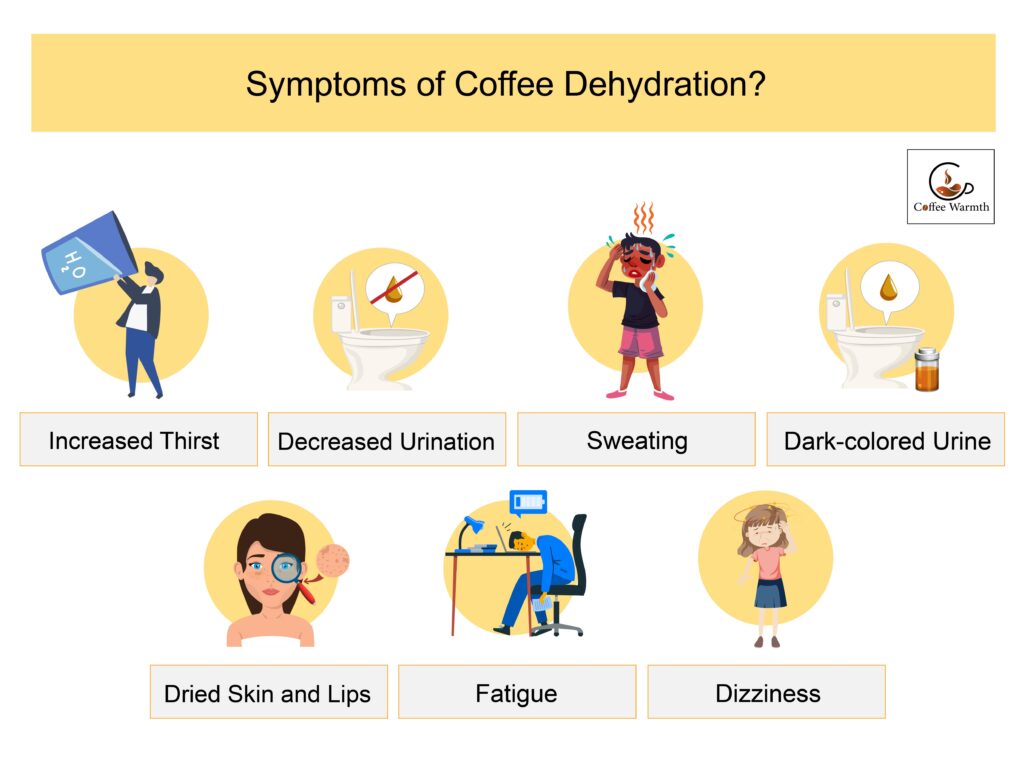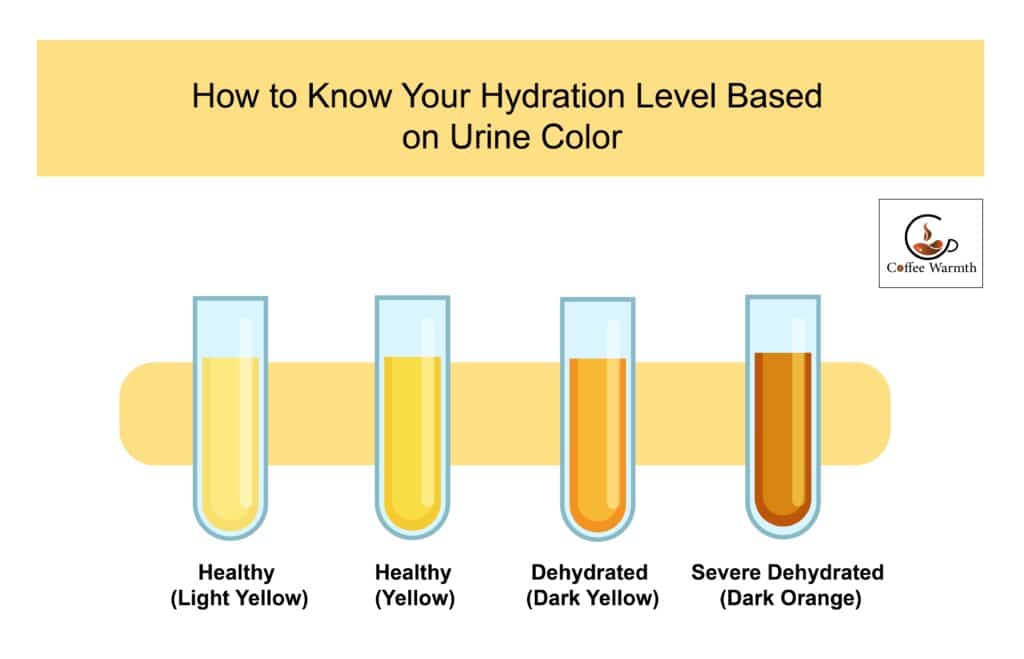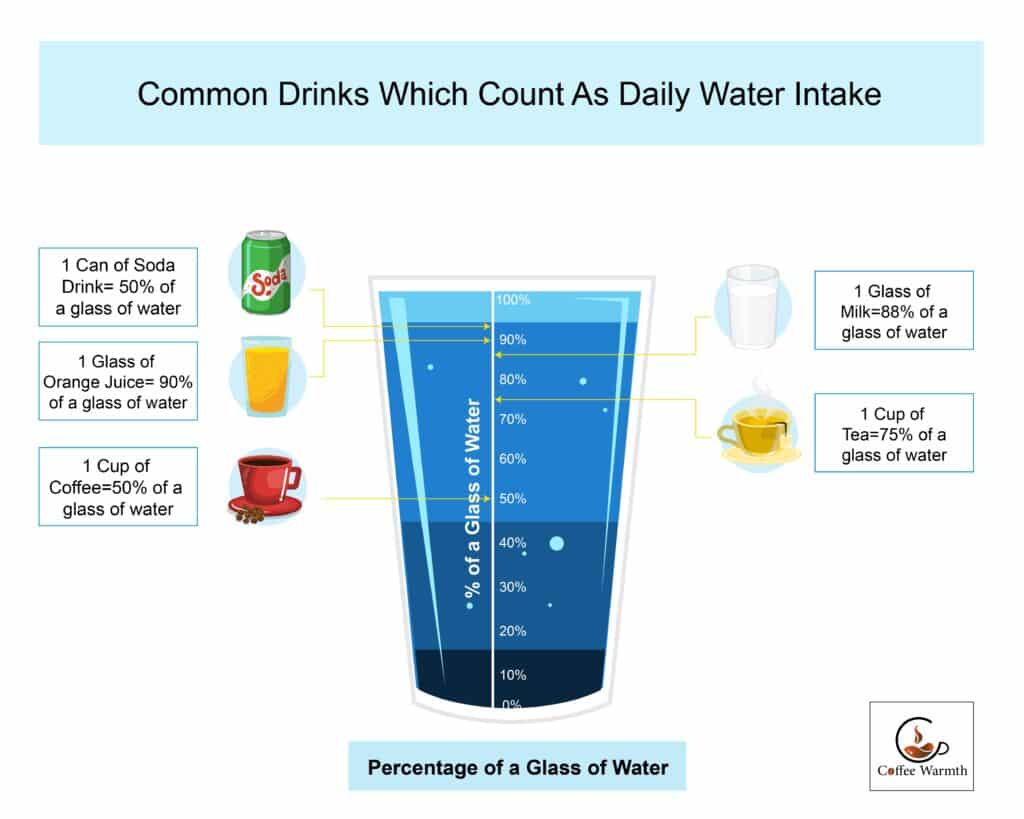Caffeine in coffee may or may not dehydrate you depending on your amount of coffee and fluid intake and whether you are a habitual consumer or not.
Dehydration occurs when your body loses more fluid than you take in. This fluid imbalance upsets the balance of minerals in your body which affects its normal functioning. Coffee dehydration is defined as fluid and mineral imbalance caused by increased diuresis and hidrosis after drinking coffee. Although the diuretic and hidrosis effect of coffee is minimal, it can lead to coffee dehydration in those who don’t consume coffee regularly.
Coffee dehydration, if occurs, has similar effects and symptoms to normal dehydration. You will feel thirsty, will urinate and sweat less, have dry lips and skin, and will feel fatigued.
Coffee drinks with the most amount of caffeine have higher chances of causing dehydration because caffeine is the main diuretic component of coffee. Coffee can cause dehydration only if you consume excess amounts beyond the FDA’s recommendation. Although a cup of coffee equals half a glass of water intake, drinking in excess will cause diuresis and sweating which will make you lose lots of fluid.
Does coffee dehydrate you?
Coffee may or may not dehydrate you depending on your caffeine intake and whether you are a regular coffee drinker or not. Caffeine is a mild diuretic which increases the flow of urine and removes sodium from the body. Sodium removal, in return, further eliminates water from the body which may cause dehydration according to Dr. Gregory Quayle, American Board of Medical Specialties-certified urologist.
Regular coffee drinkers develop tolerance and have no real significance on the overall hydration status according to Marie Spano, Registered Dietitian. However, casual coffee drinkers with lower tolerance may feel more dehydration. Marie Spano says that casual coffee consumers with 2-3 cups (16-24 fl. oz.) of coffee may have an increased urine output.
However, everyone reacts differently to coffee because of varying hydration status. NussbaumRD, clinical dietitian and nutritionist at Yale New Haven Hospital, says that after drinking coffee, you should focus on how your body feels, how many bathroom trips you have, and take fluids based on that.
Normal caffeine intake does not increase the risk of dehydration in athletes and non-athletes, according to the American Academy of Family Physicians.
Is drinking coffee a diuretic?
Yes, drinking coffee is a diuretic. Caffeine in coffee is an active diuretic component. Caffeine increases urine output by antagonizing adenosine receptors. Caffeine increases glomerular filtration rate by constricting renal arterioles and inhibits sodium reabsorption in the kidneys, according to a study published in the Med Sci (Paris). Both these factors can lead to dehydration as illustrated in the image below.

Caffeine in coffee induces diuresis and increases excretion of sodium and potassium during short term administration. Davide Bolignano M.D., professor and nephrologist at Università Magna Graecia di Catanzaro says “consuming 5 mg/kg of caffeine orally increases urinary flow and minerals loss for the next 24 hours”.
Adam D. Seal, Hydration Science Laboratory, University of Arkansas states that caffeine intake of 6 mg/kg in the form of coffee induces an acute diuretic effect. Whereas, 3 mg/kg does not cause diuresis in regular healthy coffee drinkers.
Another study in the Journal of Science and Medicine in Sport in 2015 concludes that the diuretic effect of drinking coffee is minimal and it is more pronounced in females than males. Diuresis was not seen in exercising individuals which shows that drinking coffee is a safe option for athletes as long as their daily fluid intake is fulfilled.
What are the effects of coffee dehydration?
The effects of coffee dehydration include mild issues like increased thirst, decreased urination and sweating, dark-colored urine, and dried skin and lips, and serious issues such as fatigue and dizziness.
Although the effects of coffee dehydration are rare, it can have the same impact as dehydration caused by other reasons. This is why it is important to drink a proper amount of daily water when you’re a regular coffee consumer.
Does coffee dehydrate your skin?
Yes, coffee dehydrates your skin by excreting fluids from your body. Drinking coffee causes diuresis, increases the urine output, and leads to water shortage. The effect on the skin is visible only when diuresis occurs and you do not complete your daily water intake.
Dehydration leaves your skin rough and scaly with dry patches in long-term dehydration. Your skin appears dull and darker than normal during the phase of coffee dehydration.
What are the symptoms of coffee dehydration?
The symptoms of coffee dehydration are increased thirst, decreased urination and sweating, dark-colored urine, dried skin and lips, fatigue, and dizziness. These aforesaid symptoms are also listed in the figure below.

Increased Thirst
Thirst is the brain’s way of warning that you’re dehydrated because you’re either not drinking enough fluid or losing lots of it, according to NHS inform.
The diuretic nature of coffee makes your body lose fluid. If this fluid loss is not fulfilled, you might feel thirsty or even parched.
Increased thirst occurs in extreme coffee dehydration cases as mild dehydration is often masked. Dr. William M. Adams from University of California says in a study that thirst is not a good measure for hydration status as it guides hydration during extreme dehydration only.
Decreased Urination and Sweating
Urinating 4-10 times a day and sweating 1-10 liters per day is normal for a healthy adult and anything less than this shows dehydration.
Drinking coffee causes diuresis and increased sweating acutely. However, after coffee dehydration, there is decreased urination and sweating due to lack of fluids in the body.
A study published in the Frontiers in Bioscience-Scholar discusses that dehydration causes inadequate sweating in healthy individuals.
Dark-colored urine
Urine color is a good measure to test body dehydration. A pale or transparent yellow color shows normal hydration whereas a darker urine shows body dehydration, according to a study in Frontiers Nutrition.
Coffee dehydration turns urine color dark as more urobilin is excreted than fluid in the urine as stated in a study published in the Current Opinion in Clinical Nutrition and Metabolic Care.
To check level of your coffee dehydration, urine color sample is shown in the figure below ranging from healthy to severely dehydrated.

Dried skin and lips
Loss of fluids due to drinking coffee shows signs and symptoms on the skin. The skin and lips appear dry, scaly, itchy, and dull. The skin and lips become less elastic showing evidence of lack of hydration.
Fatigue
Fatigue is defined as an extreme and persistent tiredness, weakness or exhaustion that could be mental, physical or both.
Coffee dehydration may present as a feeling of tiredness or lethargy due to fluids shortage. A study published in the British Journal of Nutrition states that fatigue increases during dehydration at both rest and during exercise.
Dizziness
Dizziness describes a range of feelings like feeling unsteady, woozy, weak or faint.
Coffee dehydration leads to dizziness because of low blood level in the brain. A lack of circulatory fluids, necessary for body energy, reduces perfusion of the brain which causes dizziness, according to a study published in the Clinical Autonomic Dysfunction.
Why does coffee make you thirsty?
Drinking coffee makes you thirsty because of the diuretic effect of caffeine which causes your body to lose fluids by increasing urine output. If this is not compensated with enough water, it makes you thirsty.
According to a study published by H.J. Smit & P.J. Rogers in the Journal of Psychopharmacology, regular caffeine consumers have substantial tolerance to thirst, however caffeine increases thirst in low dose coffee consumers.
Why does coffee make you pee more?
Coffee makes you pee more due to its diuretic nature. Diuretic effect means to increase fluid excretion through urination. Drinking coffee increases frequency of urination and urgency, according to a study published in Urology Annals.
‘Caffeinated coffee fills the bladder and sends signals to the micronutrition center to pee’, says Lisa Anderson, Associate Professor at the University of Minnesota.
Dr. Rena Malik, Urologist and Assistant Professor at University of Maryland School of Medicine, says that caffeine causes bladder contraction which urges one to urinate.
Furthermore, caffeine in coffee also inhibits the production of antidiuretic hormone (ADH). Low ADH level increases water excretion and decreases water absorption from the kidneys.
Why do you sweat after drinking coffee?
You sweat after drinking coffee because coffee increases heat production in the body. Caffeine in coffee revs up your central nervous system and increases adrenaline and cortisol hormones. Adrenaline and cortisol production causes an increase in heart rate, generates heat, and stimulates sweat glands to regulate the body temperature. The body secretes sweat to cool down the temperature. Sweat glands present in your armpits, groin, and eyelids produce sweat after drinking coffee.
According to a study published in the Journal of Medicinal Food, coffee ingestion increases thermogenesis as well as sweating sensitivity. The heat from the hot cup of joe may cause you to sweat as well.
The image below lists why do you sweat after drinking coffee.

How much coffee can dehydrate you?
Drinking high amounts of coffee i.e. more than 5-6 cups (40-48 fl. oz.) or 500 mg caffeine might dehydrate you. If you have any underlying disease or your daily water intake is below 2 cups (16 fl. oz.), then drinking large amounts of coffee can cause dehydration.
Regular coffee consumers develop tolerance against coffee’s diuretic effect within 4 days, according to a research conducted in University of Birmingham. Thus, you need to drink considerably large amounts of coffee to trigger dehydration
Drinking low to moderate amounts of coffee i.e. 300-400 mg or 3-5 cups (24-40 fl. oz.) of coffee does not cause dehydration in habitual coffee consumers and individuals doing exercise, according to a systematic review published in British Nutrition Foundation.
Can drinking coffee count as daily water intake? H3
Yes, drinking coffee counts as daily water intake.
Dr. Catherine Waldrop, physician in New York, says that one cup (8 fl. oz.) of drinking coffee is equal to half a cup of water.
Lauren DeWolf, a registered dietitian with Sharp Rees-Stealy Medical Centers, states that drinking coffee adds to your daily water intake. Although caffeine in coffee has a diuretic effect, it is not enough to cancel out the hydrating benefits of drinking coffee. Moderate coffee intake has the same hydrating quality as water in regular coffee drinkers, according to a study in Plos One in 2014.
Another study in the American Journal of Physiology concludes that beverages like coffee and tea add to the daily recommended water intake.
The graphic lists common drinks that count as water intake and its relative concentration to a glass of water.

Which Coffee Drinks Can Cause Dehydration?
The coffee drinks which can cause dehydration depend on the caffeine content and volume of the beverage. The following table lists coffee drinks which can cause dehydration according to the caffeine content and volume.
| Coffee Drink | Caffeine(mg) in 8 fl. oz. | Common Serving Size/ Volume (fl. oz.) | Risk of Dehydration | |
| 1. | Decaf Coffee | 1.8 | 6 | Minimum |
| 2. | Mocha | 2.5 | 13.7 | Minimum |
| 3. | Cafe Au Lait | 47.5 | 8 | Minimum |
| 4. | Cappuccino | 62.8 | 8 | Moderate |
| 5. | Latte | 62.8 | 8 | Moderate |
| 6. | Flat White | 81.6 | 8 | Moderate |
| 7. | Cold Brew | 94.8 | 8 | Moderate |
| 8. | Black Coffee | 95 | 8 | Moderate |
| 9. | Americano | 104.6 | 8 | Maximum |
| 10. | Macchiato | 125.5 | 1.35 | Maximum |
| 11. | Cortado | 188.3 | 3 | Maximum |
| 12. | Espresso | 502 | 1.01 | Maximum |
Does decaf coffee cause dehydration?
No, decaf coffee does not cause dehydration due to its low caffeine content. Since the diuretic effect of coffee is due to caffeine and decaf coffee has low caffeine content, decaf doesn’t cause diuretic effects preventing dehydration.
Decaf coffee contains small traces of caffeine of about 1.5 mg in one cup ( 8 fl. oz.) which is significantly lower than 95 mg of a regular cup (8 fl. oz.) of coffee.
Does black coffee dehydrate you?
Whether black coffee dehydrates you or not depends on the amount of black coffee you consume and if you’re a regular consumer or not.
Black coffee contains 95 mg caffeine in a regular 8 fluid ounce cup. Drinking large amounts of black coffee i.e. 5 to 6 cups (40-48 fl. oz.) would increase the caffeine content leading to pronounced diuresis.
In case, you just started out on black coffee today or yesterday, be mindful of how many cups you’re drinking. The effect of diuresis is maximal within the first 4 days of coffee consumption but reduces significantly afterwards.
How to treat coffee dehydration?
Coffee dehydration can be treated in the following common ways according to medical professionals like Nina S. Stachenfeld and Timothy A. Sentongo.
- Drinking fluids like water and juices will help reverse dehydration.
- Drinking oral rehydration solution (ORS) will correct electrolyte imbalance.
- Cutting down on excess caffeine intake will stop diuresis.
